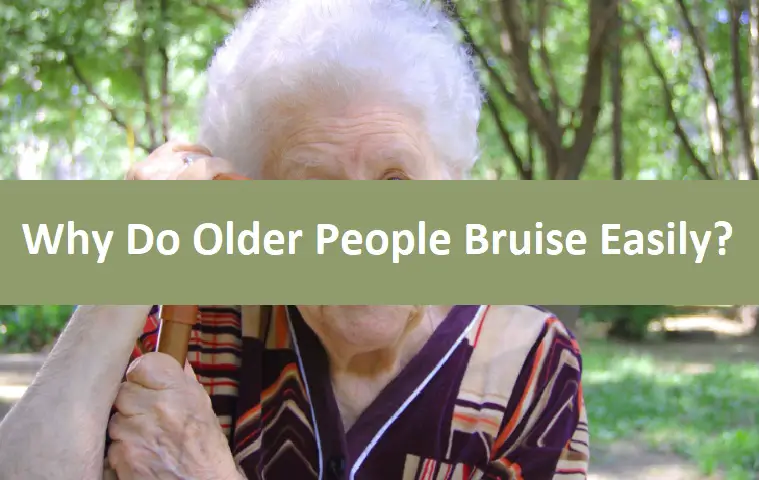As you age, you may notice that you bruise more easily than you used to. This is a common concern among seniors, and it can be caused by a variety of factors. In this article, we will explore the reasons why older adults may bruise easily, whether medications play a role in this, and how to prevent and treat bruises.
Why Do Older People Bruise Easily?
One reason that seniors may bruise easily is that their skin becomes thinner and less elastic as they age. This makes it more vulnerable to injury and can lead to bruising even from minor bumps or impacts. Additionally, blood vessels in the skin become more fragile, making them more prone to breaking and causing bruising.
Other factors that can contribute to easy bruising in seniors include:
- A decrease in collagen production, which makes the skin less able to withstand trauma
- A decrease in the number and function of platelets, which are necessary for blood clotting
- Long-term exposure to the sun, which can damage the skin and blood vessels
- Chronic medical conditions such as diabetes or kidney disease, which can affect blood vessel health
Can Medications Cause Easy Bruising?
Yes, certain medications can increase the likelihood of bruising in seniors.
Blood thinners such as aspirin, warfarin, and clopidogrel can make it easier for blood vessels to rupture and cause bruising. Nonsteroidal anti-inflammatory drugs (NSAIDs) such as ibuprofen and naproxen can also increase the risk of bruising.
Other medications that can cause easy bruising in seniors include:
- Corticosteroids, which can weaken blood vessels and decrease collagen production
- Antidepressants, which can interfere with blood clotting
- Blood pressure medications such as ACE inhibitors and beta-blockers, which can cause blood vessels to become more fragile
- Chemotherapy drugs, which can damage the skin and blood vessels
If you are taking any of these medications and notice that you are bruising more easily than usual, talk to your doctor. They may be able to adjust your current dosage or offer you an alternative that is less likely to cause bruising.
Can Easy Bruising Be a Sign of a More Serious Problem?
In some cases, easy bruising can be a sign of a more serious underlying condition.
For example, bleeding disorders such as hemophilia or von Willebrand disease can cause excessive bruising and bleeding. Leukemia, liver disease, and certain types of cancer can also cause easy bruising.
Other signs that may indicate an underlying medical condition include:
- Large or unusual bruises that occur without any obvious cause
- Bruising that takes a long time to heal or does not seem to be improving
- Bruising accompanied by other symptoms such as fatigue, weight loss, or fever
If you notice that you are bruising more easily than usual, it is important to talk to your healthcare provider. They may recommend further testing to rule out any underlying medical conditions or refer you to a specialist for further evaluation.
How Do You Prevent Bruises?
While you may not be able to completely prevent bruising, there are steps you can take to minimize your risk.
First, look at the lighting in your home. Poor lighting can increase the risk of falls, which can lead to bruises. So, make sure your home is well-lit, especially in areas where you walk or spend a lot of time. Also, remove any furniture or other items that may obstruct your path.
Another thing you can do is side the side effects of the medications you take. For example, certain blood-thinning medications, such as aspirin or warfarin, can make you more susceptible to bruising. So, make sure to talk to your doctor about any potential side effects and ways to prevent bruising.
Finally, consider getting tested for any underlying medical conditions that may increase your risk of bruising. This can include conditions such as anemia or vitamin deficiencies. Your doctor may be able to recommend supplements or other treatments to help improve your skin’s health.
Other ways to prevent bruises include:
- Eating a healthy diet that is rich in nutrients that promote skin health
- Using sunscreen to protect your skin from the harmful effects of the sun
- Staying hydrated to keep your skin and blood vessels healthy
- Engaging in regular exercise to help maintain balance and muscle strength
How Do You Treat Bruises?
Unfortunately, there is no cure for bruises. However, there are things you can do to help reduce the pain and swelling associated with a bruise. Applying a cold compress or ice pack to the affected area can help to reduce swelling and ease pain. You can also elevate the affected area to help reduce swelling.
Conclusion
Easy bruising is a common concern among seniors, but it is not always a cause for alarm. While thinning skin and certain medications can contribute to bruising, there are steps you can take to reduce your risk and promote healing if you do experience a bruise.
By staying active, eating a healthy diet, and working with your healthcare provider to manage any underlying medical conditions, you can maintain your overall health and well-being as you age.
Remember, with proper care and attention, it is possible to enjoy a fulfilling and active lifestyle well into your golden years.

Morgan Elfman is a compassionate writer, dedicated caregiver, and passionate advocate for senior well-being. Born and raised with a deep sense of empathy and a natural inclination towards service, Morgan has devoted her life to making a positive impact on the lives of seniors.
As a writer for www.choiceseniorlife.com, Morgan utilizes his skills to create insightful and informative content that addresses the unique needs and challenges faced by seniors and their families. Her articles not only provide valuable information on health, lifestyle, and care options but also strive to inspire and empower seniors to lead fulfilling lives.

